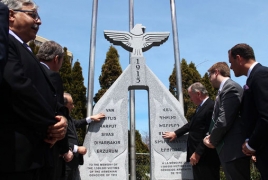Armenian Genocide memorial unveiled in Canada’s Niagara May 2, 2016 - 10:38 AMT PanARMENIAN.Net - On Saturday, April 30, the Armenian Community of St. Catharines, Niagara, once again gathered for a solemn occasion, to commemorate the 101st anniversary of the Armenian Genocide, Horizon Weekly reports. Hundreds of community members from all over the Niagara Region and elsewhere gathered at the Armenian Community Centre on 156 Martindale Road, for the official unveiling and dedication ceremony of the Armenian Genocide Memorial of St. Catharines. The monument that was unveiled on the front lawn of the Armenian Community Centre, will stand to observe the memory of the 1.5 million victims of the Armenian Genocide. “The unveiling of this monument in the historic Armenian community of St. Catharines will first of all serve to show our collective commitment towards remembering our past and demanding justice to take its course and also to educate the upcoming generations about what occurred in the past and how we should stand together today, as guardians of our identity and history” said Sevag Belian, secretary of the Armenian National Committee of St.Catharines, and a member of the Armenian Youth Federation of Canada. Along with the hundreds of attendants, His Excellency ArmenYeganian, the Ambassador of the Republic of Armenia in Canada, Mr. Marc Truyet, the Consul-General of France in Toronto, Members of the Clergy, representatives from the ARF Bureau, ARF Canada Central Committee and the Armenian National Committee of Canada, elected officials from all three levels of government, and the Mayor of St. Catharines were given the honor to unveil the monument. A traditional Armenian khatchkar was also placed in front of the monument, symbolizing the spiritual ties of the Armenian people to the Christian faith. The khatchkar was ceremoniously consecrated under the auspices of Archbishop Suren Kataroian and Bishop Abgar Hovakimian.  The Armenian Genocide The Armenian Genocide (1915-23) was the deliberate and systematic destruction of the Armenian population of the Ottoman Empire during and just after World War I. It was characterized by massacres and deportations, involving forced marches under conditions designed to lead to the death of the deportees, with the total number of deaths reaching 1.5 million. Six total incidents have burned 19 old-growth trees. Friday night 8 trees were torched along the beautiful main entrance. The EU does not intend to conduct military exercises with Armenia, Lead Spokesperson for EU Foreign Affairs and Security Policy Peter Stano says. Hikmet Hajiyev has said that there is no place for USAID operation in Azerbaijan any longer. A telephone conversation between Putin and Pashinyan before the CSTO summit is not planned, Peskov says. Partner news |